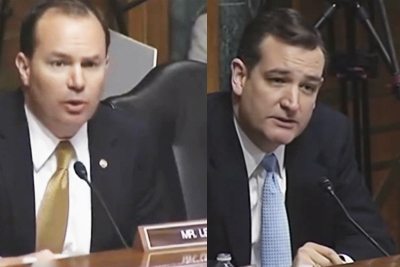Ted Cruz, Mike Lee Introduce Bill to Stem Benefits to Same-Sex Spouses
With virtually no chance of passage in the current Congress, the Cruz-Lee bill appears to be motivated by politics.

As the winter snows put a freeze on congressional action, Sens. Ted Cruz (R-TX) and Mike Lee (R-UT) took advantage of the lull on Thursday to introduce S. 2024, a bill that would empower the states to decide whether to extend the rights accorded to married couples in the federal justice system to legally married same-sex spouses.
In a statement announcing their so-called State Marriage Defense Act, the Tea Party-allied senators called the Supreme Court’s historic decision in United States v. Windsor, which effectively overturned the 1996 Defense of Marriage Act (DOMA), “improperly” decided and an infringement of the sovereignty of the states under the Tenth Amendment.
The move by Cruz and Lee appears to have been prompted by the February 8 announcement by Attorney General Eric Holder that the Department of Justice (DOJ) would afford same-sex spouses the same rights and privileges that opposite-sex married couples enjoy when dealing with the federal justice system, regardless of whether the state in which the DOJ claims jurisdiction on a particular matter recognizes marriages between members of the same sex. These include a prohibition on requiring spouses to testify against one another, as well as spousal privileges between inmates in federal prisons.
“The Obama Administration should not be trying to force gay marriage on all 50 states,” Cruz said in a written statement. “We should respect the states, and the definition of marriage should be left to democratically elected legislatures, not dictated from Washington. This bill will safeguard the ability of states to preserve traditional marriage for its residents.”
With virtually no chance of passage in the current Congress, the Cruz-Lee bill appears to be motivated by politics. Cruz is often cited as a potential candidate for the 2016 presidential race, and has a knack for drawing attention to himself, as he did when he convinced Tea Party-allied members of the House of Representatives to shut down down the federal government in October—a move that played badly with the general public, but won approval from the right-wing base that turns out in Republican presidential primaries.
Lee, on the other hand, suffered a drop in popularity since the government shutdown, after he joined Cruz’s filibuster-like marathon speech arguing for the repeal of the Affordable Care Act in exchange for the passage of the continuing resolution that was needed to keep the government open. But in Utah, where politics are dominated by the anti-LGBT Church of Jesus Christ of Latter-day Saints, the faith home of Mormons, Lee is likely eager to change the subject back to a topic that enjoys more popular support in his home state. A recent ruling by a federal judge that overturned Utah’s ban on same-sex marriage created an uproar when it was issued in December. It has since been stayed by the U.S. Supreme Court.
Both Lee and Cruz are inflexibly anti-choice. At the 2013 Values Voter Summit convened by FRC Action, the political arm of the Family Research Council, Cruz falsely claimed that, under Obamacare, Christian businesses would be faced to offer “abortifacients” to their employees.
In 2012, Lee led the charge against ratification of the United Nations Convention on Persons With Disabilities, in part because of a false claim that a section of the treaty that guaranteed equal access to reproductive health services by disabled people granted a universal right to abortion.

